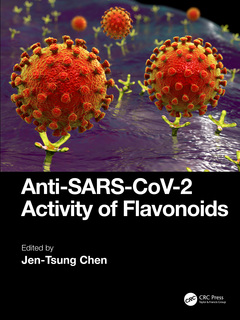Description
Anti-SARS-CoV-2 Activity of Flavonoids
Language: English
Keywords
traditional medicines; systems pharmacology; SARS-Cov-2; severe acute respiratory syndrome (SARS); pharmacology; natural products; omics; medicinal plants; herbal medicines; flavonoids; ethnopharmacology; drug discovery; coronavirus pathogenesis; coronavirus disease 2019 (COVID-19); coronaviruses; bioinformatics; bioactive compounds
· 21x28 cm · Relié
Résumé
/li>Sommaire
/li>Biographie
/li>
In the past years, COVID-19 caused millions of deaths and severely damaged not only public health, but also the global economy. New variants continue to threaten human health. Thus, natural compounds for retarding infection are in high demand. This book summarizes the emerging research with flavonoids, whose application holds great promise of anti-virus, anti-inflammation, antioxidative stress, and immunomodulatory. Topics include the role of flavonoids in preventing an inflammatory storm and how flavonoids interact with critical protein targets that are involved in the infection stages of COVID-19.
Key Features
? Highlights anti-SARS-CoV-2 research drug discovery on natural products and medicinal plants
? Includes all major subclasses of flavonoids promisingly combat COVID-19
? Proposes molecular mechanisms of flavonoids against protein targets of SARS-CoV-2
? Contributions from an international team of leading researchers
? Provides recommendations with respect to the future research
Chapter 1: Flavonoids: Molecular mechanisms of anti-SARS-CoV-2 activity and their role in COVID-19 management. Chapter 2: Traditional herbal medicines for COVID-19: The impact of flavonoids. Chapter 3: Flavonoids as potential drugs for combating SARS-CoV-2: Molecular docking studies. Chapter 4: Molecular aspects on anti-SARS-CoV-2 activity of flavonols: Inhibitory on protein targets, immunomodulatory, and anti-inflammatory effects. Chapter 5: A comprehensive on flavonoids targeting RNA-dependent RNA polymerase of SARS-CoV-2. Chapter 6: Flavonols and their derivatives: pioneer natural compounds as potential antiviral drugs against COVID-19. Chapter 7: Anti-SARS-CoV-2 activity of flavonols and their glycosylated derivatives. Chapter 8: Isoflavonoids as bioactive molecules against SARS-CoV-2. Chapter 9: Anti-SARS-CoV-2 activity of flavones: Molecular mechanisms and its role in COVID-19 management. Chapter 10: Anti-SARS-CoV-2 activity of chalcones and their synthetic derivatives. Chapter 11: Plant-derived polyphenols in modulating the immune response against COVID-19. Chapter 12: Molecular insights into anti-SARS-CoV-2 activity of catechins against protein targets for COVID-19 management. Chapter 13: Role of quercetin in managing COVID-19. Chapter 14: Molecular aspects in pharmacological actions of quercetin targeting life cycle of SARS-CoV-2. Chapter 15: Preventive and therapeutic potentials of epigallocatechin gallate for the management of COVID-19: A mechanistic insight. Chapter 16: Anti-SARS-CoV-2 catechins and their roles in COVID-19 management. Chapter 17: Green tea catechins against SARS-CoV-2. Chapter 18: Antiviral activities of naringenin and its derivatives as adjuvant treatment against SARS-CoV-2 infections. Chapter 19: Luteolin and chrysin as inhibitors of SARS-CoV-2 infection. Chapter 20: Flavonoids: Inhibitors at Stages of Infection by SARS-CoV-2. Chapter 21: Traditional medicines and functional foods in Indochina for COVID-19 management: The impact of flavonoids.
Jen-Tsung Chen is a professor of cell biology at the National University of Kaohsiung in Taiwan. He also teaches genomics, proteomics, plant physiology, and plant biotechnology. Dr. Chen’s research interests include bioactive compounds, chromatography techniques, plant molecular biology, plant biotechnology, bioinformatics, and systems pharmacology. He is an active editor of academic books and international journals to advance the exploration of multidisciplinary knowledge involving plant physiology, plant biotechnology, nanotechnology, materials science, ethnopharmacology, and systems biology. He serves as an associate editor, editorial board member, and guest editor in reputed journals. Dr. Chen published books in collaboration with international publishers and he is handling book projects on diverse topics such as drug discovery, herbal medicine, medicinal biotechnology, nanotechnology, bioengineering, plant functional genomics, plant speed breeding, epigenetics, functional RNAs, and CRISPR-based plant genome editing. Dr. Chen is a productive author in academic publications and has been included in the World's Top 2% Scientists 2023 by Stanford University.




